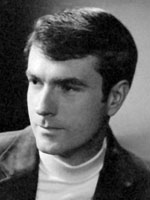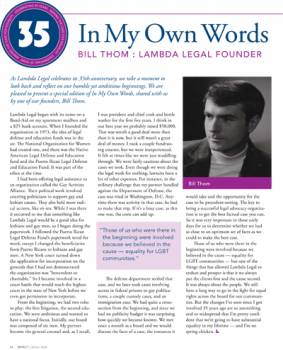
In My Own Words
As Lambda Legal celebrates its 35th anniversary, we take a moment to look back and reflect on our humble yet ambitious beginnings. We are pleased to present a special edition of In My Own Words, shared with us by one of our founders, Bill Thom.
Lambda Legal began with its name on a Band-Aid on my apartment mailbox and a $25 bank account. When I founded the organization in 1973, the idea of legal defense and education funds was in the air. The National Organization for Women had created one, and there was the Native American Legal Defense and Education fund and the Puerto Rican Legal Defense and Education Fund. It was part of the ethos at the time.

“Those of us who were there in the beginning were involved because we believed in the cause — equality for LGBT communities.“
I had been offering legal assistance to an organization called the Gay Activists Alliance. Their political work involved courting politicians to support gay and lesbian causes. They also held more radical actions, like sit-ins. While I was there it occurred to me that something like Lambda Legal would be a good idea for lesbians and gay men, so I began doing the paperwork. I followed the Puerto Rican Legal Defense Fund’s paperwork word for word, except I changed the beneficiaries from Puerto Ricans to lesbians and gay men. A New York court turned down the application for incorporation on the grounds that I had not demonstrated the organization was “benevolent or charitable.” So I became involved in a court battle that would reach the highest court in the state of New York before we even got permission to incorporate.
From the beginning, we had two roles to play: the first litigation, the second education. We were ambitious and wanted to have a national focus. Initially, our board was composed of six men. My partner became the general counsel and, as I recall, I was president and chief cook and bottle washer for the first five years. I think in our best year we probably raised $50,000. That was worth a good deal more then than it is now, but it still wasn’t a great deal of money. I took a couple fundraising courses, but we were inexperienced. It felt at times like we were just muddling through. We were fairly cautious about the cases we took. Even though we were doing the legal work for nothing, lawsuits have a lot of other expenses. For instance, in the military challenge that my partner handled against the Department of Defense, the case was tried in Washington, D.C. Anytime there was activity in that case, he had to make that trip. If it’s a busy case, as this one was, the costs can add up.
The defense department settled that case, and we later took cases involving access in federal prisons to gay publications, a couple custody cases, and an immigration case. We had quite a crosssection from the beginning, and since we had no publicity budget it was surprising how quickly we became known. We met once a month as a board and we would discuss the facts of a case, the resources it would take and the opportunity for the case to be precedent-setting. The key to being a successful legal advocacy organization is to get the best factual case you can. So it was very important in those early days for us to determine whether we had as close to an optimum set of facts as we could to make the best case.
Those of us who were there in the beginning were involved because we believed in the cause — equality for LGBT communities — but one of the things that has allowed Lambda Legal to endure and prosper is that it we always put the clients first and the cause second. It was always about the people. We still have a long way to go in the fight for equal rights across the board for our communities. But the changes I’ve seen since I got involved 35 years ago are so astonishing and so widespread that I’m pretty confident that we’re going to have substantial equality in my lifetime — and I’m no spring chicken.

